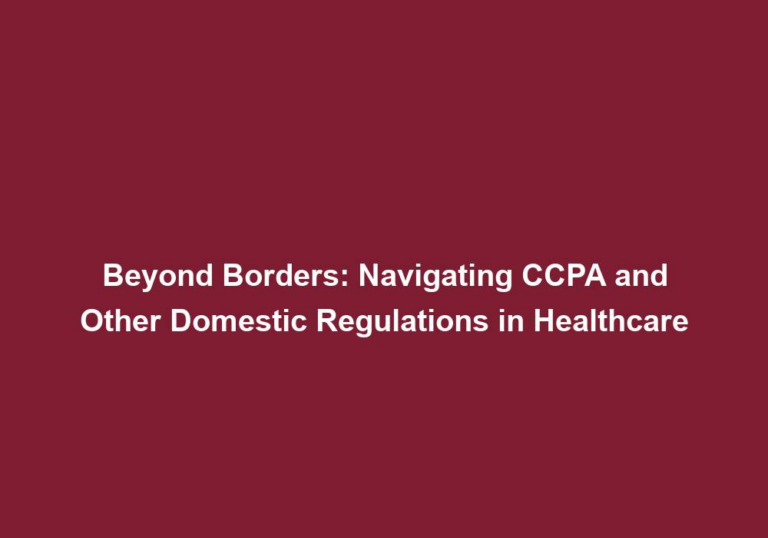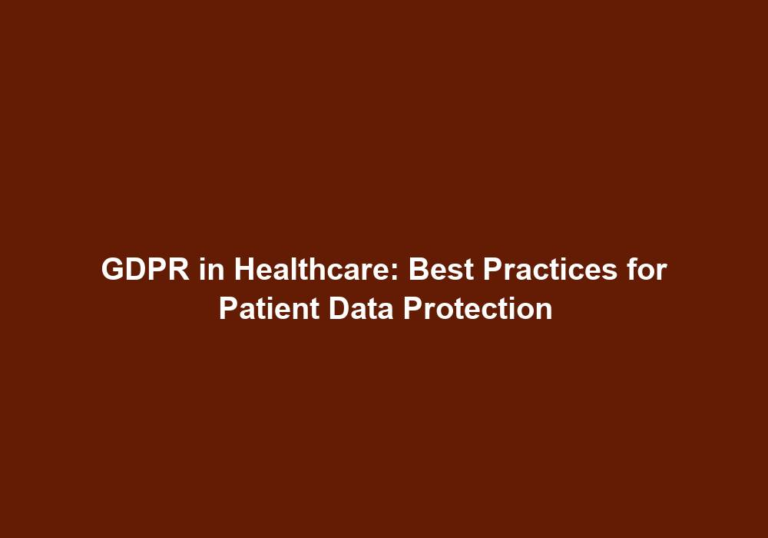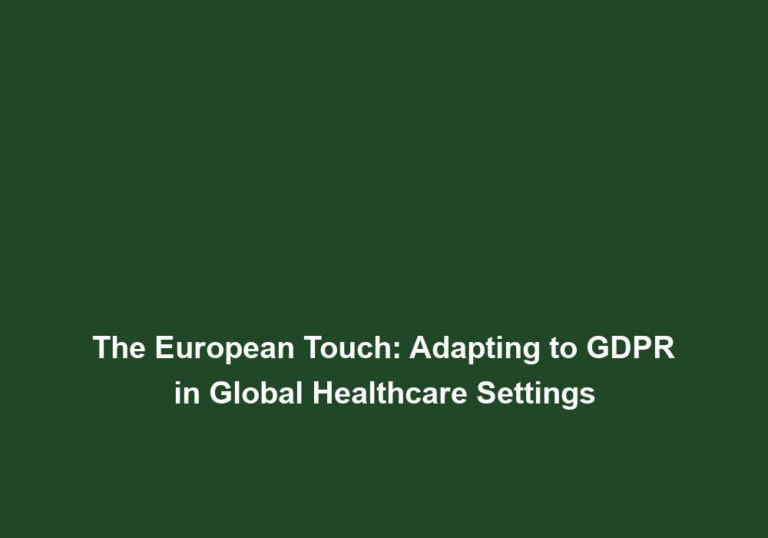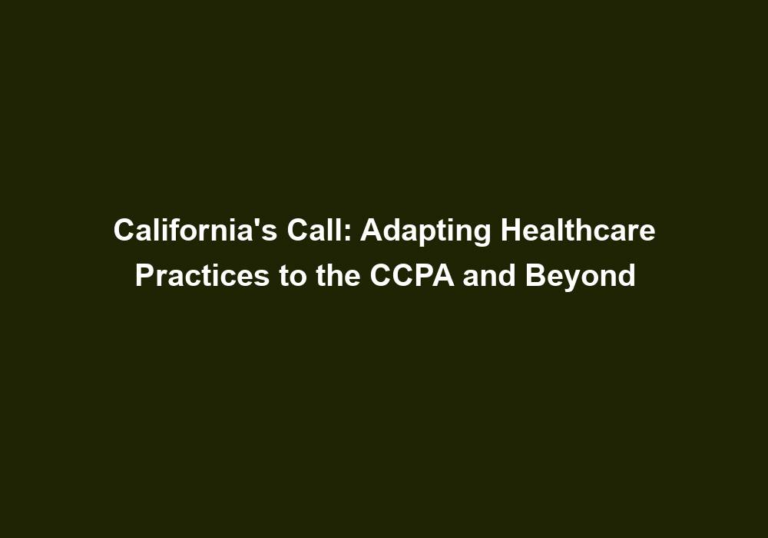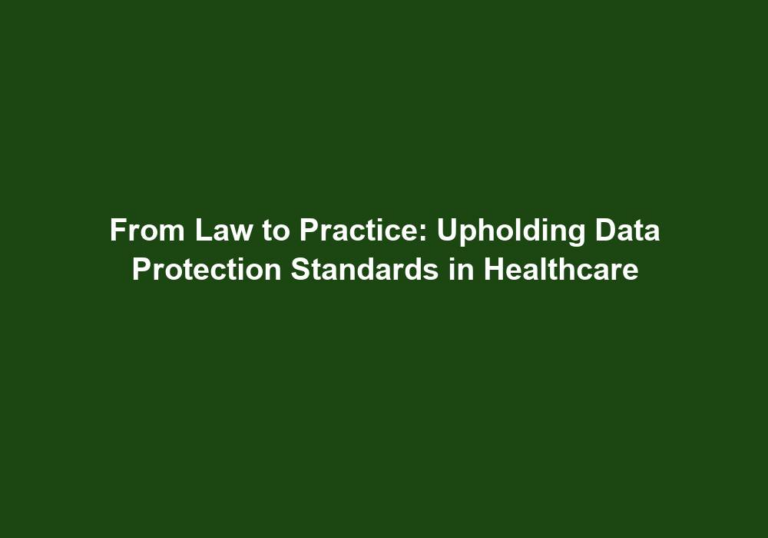Meeting the GDPR Standard: A Healthcare Institution’s Guide
As a healthcare institution, it is essential to prioritize data privacy and security to comply with the General Data Protection Regulation (GDPR). This comprehensive guide aims to help you navigate through the intricacies of GDPR and ensure that your healthcare organization meets the standard. By understanding the requirements and implementing necessary measures, you can protect sensitive data, build trust with patients, and avoid potential penalties.
Understanding GDPR in the Healthcare Industry
The GDPR is a regulation that sets the rules for data protection and privacy in the European Union (EU). Its primary objective is to give individuals control over their personal data and harmonize data protection laws across EU member states. Regardless of the location of your healthcare institution, if you handle personal data of EU residents, you must comply with GDPR.
The Key Principles of GDPR
To meet the GDPR standard, healthcare institutions must adhere to the following fundamental principles:
-
Lawfulness, Fairness, and Transparency: Healthcare institutions must process personal data lawfully, fairly, and in a transparent manner. This means that patients should be informed about the purpose and legal basis for data processing, ensuring they have a clear understanding of how their data is being used and why.
-
Purpose Limitation: Personal data should be collected for specified, explicit, and legitimate purposes. Any further processing of the data should be compatible with these original purposes. It is important for healthcare institutions to clearly define and communicate the purposes for which they collect personal data, ensuring that patients’ information is not used in ways they did not consent to.
-
Data Minimization: It is crucial to collect only the necessary personal data required for the intended purpose. Healthcare institutions should review their data collection practices and ensure they only gather what is essential. By minimizing the amount of personal data collected, institutions can reduce the risk of data breaches and unauthorized access.
-
Accuracy: Personal data must be accurate and kept up to date. Measures should be in place to rectify or erase inaccurate or incomplete data. Healthcare institutions should establish processes to regularly review and update personal data, ensuring its accuracy and reliability.
-
Storage Limitation: Personal data should be stored for no longer than necessary. Regular reviews of data retention policies and secure disposal of data should be conducted. This helps minimize the risk of data breaches and ensures that personal data is only retained for as long as it serves a legitimate purpose.
-
Integrity and Confidentiality: Robust security measures must be implemented to protect personal data against unauthorized access, loss, or destruction. Regular security audits and staff training are essential to maintain data integrity and confidentiality. Healthcare institutions should invest in secure data storage systems, encryption, and access controls to safeguard patient information.
Lawful Basis for Processing Personal Data
To process personal data lawfully under GDPR, healthcare institutions must establish a lawful basis for processing. The following legal bases are relevant for the healthcare sector:
-
Consent: Patients provide explicit consent for processing their personal data for specific purposes. However, consent must be freely given, informed, and easily withdrawable. Healthcare institutions should obtain clear and unambiguous consent from patients, providing them with sufficient information about the processing activities and their rights to withdraw consent.
-
Contractual Necessity: Processing personal data may be necessary for the performance of a contract with the patient, such as providing healthcare services or managing health insurance claims. Healthcare institutions should ensure that patients are aware of the contractual necessity for processing their data and that it is handled securely and in accordance with GDPR requirements.
-
Legal Obligations: Healthcare institutions may process personal data to comply with legal obligations, such as reporting infectious diseases or fulfilling regulatory requirements. It is crucial for institutions to have clear policies and procedures in place to ensure compliance with relevant legal obligations, while also protecting patient privacy.
-
Vital Interests: In emergency situations, where patients’ lives are at risk, personal data can be processed to protect their vital interests. Healthcare institutions should establish appropriate protocols for handling personal data in emergency situations, ensuring that patient safety is prioritized while also respecting their privacy rights.
-
Public Interest: Processing personal data can be justified if it serves a public interest, such as public health research or epidemiological studies. Healthcare institutions engaging in such activities should have robust data protection measures in place and ensure that the public interest is clearly defined and outweighs any potential risks to individual privacy.
-
Legitimate Interests: Healthcare institutions may process personal data based on their legitimate interests, provided that such interests do not override the rights and freedoms of the individuals. Institutions must conduct a legitimate interest assessment to ensure that the processing is necessary, proportionate, and respects individuals’ rights to privacy.
Rights of Data Subjects
GDPR grants data subjects several rights to ensure control and transparency over their personal data. Healthcare institutions must respect these rights and have processes in place to handle data subject requests. The key rights include:
-
Right to Access: Patients have the right to obtain a copy of their personal data and information about how it is processed. Healthcare institutions should establish procedures for handling access requests, ensuring that patients can easily exercise this right and receive the necessary information in a clear and understandable format.
-
Right to Rectification: Patients can request the correction of inaccurate or incomplete personal data. Healthcare institutions should have mechanisms in place to handle rectification requests promptly and ensure that any necessary corrections are made to the data.
-
Right to Erasure: Patients have the right to request the deletion of their personal data under certain circumstances, such as when the data is no longer necessary for the intended purpose or when the processing is based on consent. Healthcare institutions should establish procedures for handling erasure requests, ensuring that data is securely deleted and no longer accessible.
-
Right to Restrict Processing: Patients can request that the processing of their personal data be restricted in certain situations, for example, during the verification of the accuracy of data. Healthcare institutions should have processes in place to handle such requests, ensuring that data is not processed further while the restriction is in place.
-
Right to Data Portability: Patients have the right to receive their personal data in a structured, commonly used, and machine-readable format, and transmit it to another controller. Healthcare institutions should establish mechanisms for providing data portability, allowing patients to easily transfer their data to another service provider if desired.
-
Right to Object: Patients can object to the processing of their personal data based on legitimate interests or direct marketing purposes. Healthcare institutions should have procedures in place to handle such objections, ensuring that the processing of data is reviewed and justified in light of the objection.
-
Automated Decision-Making and Profiling: Healthcare institutions must inform patients if automated decision-making processes, including profiling, are used and provide meaningful information about the logic involved. Patients should have the right to opt out of such processes or request human intervention.
Implementing GDPR Compliance Measures
Complying with GDPR requires a range of measures to protect personal data and ensure ongoing compliance. Here are some essential steps for healthcare institutions:
-
Data Protection Impact Assessment (DPIA): Conduct a DPIA to identify and minimize the risks associated with data processing activities. This assessment helps in evaluating the impact on individuals’ privacy and implementing appropriate safeguards. Healthcare institutions should regularly review and update their DPIAs to reflect any changes in data processing activities.
-
Privacy Policies and Notices: Develop clear and concise privacy policies and notices, ensuring that patients are adequately informed about how their data is processed, their rights, and how to exercise them. Healthcare institutions should regularly review and update their privacy policies to reflect any changes in data processing practices or legal requirements.
-
Consent Management: Establish robust consent management processes, ensuring that patients provide informed and freely given consent. Implement mechanisms to record and manage consent, allowing individuals to easily withdraw consent when desired. Healthcare institutions should regularly review and update their consent management processes to reflect any changes in data processing activities or legal requirements.
-
Data Breach Notification: Develop procedures to detect, investigate, and report data breaches to the relevant supervisory authority and affected individuals within the required timeframe. Healthcare institutions should regularly test and update their data breach notification procedures to ensure timely and effective response to data breaches.
-
Staff Training and Awareness: Train staff members on the importance of data protection, their responsibilities, and the necessary security measures to prevent data breaches. Regular training sessions and awareness campaigns should be conducted to ensure that staff members are well-informed and equipped to handle personal data securely.
-
Third-Party Contracts: Review and update contracts with third-party service providers, ensuring they comply with GDPR requirements and adequately protect personal data. Healthcare institutions should conduct due diligence on third-party vendors and establish contractual obligations for data protection to ensure that personal data is handled securely throughout the entire data processing chain.
-
Data Transfers: Implement appropriate safeguards for transferring personal data outside the EU, such as using approved standard contractual clauses or relying on legal mechanisms like Privacy Shield. Healthcare institutions should conduct thorough assessments of data transfer requirements and ensure that adequate safeguards are in place to protect the privacy and security of personal data during transfers.
-
Data Retention and Disposal: Regularly review data retention policies, securely dispose of data that is no longer necessary, and ensure that appropriate anonymization or pseudonymization techniques are used. Healthcare institutions should establish clear guidelines for data retention and disposal, taking into account legal requirements and the principles of data minimization and storage limitation.
-
Data Protection Officer (DPO): Designate a Data Protection Officer responsible for overseeing GDPR compliance and acting as a point of contact for data protection authorities and data subjects. The DPO should have expertise in data protection and privacy laws and should be actively involved in ensuring ongoing compliance with GDPR.
-
Audits and Reviews: Conduct regular audits and reviews to assess and enhance data protection measures, ensuring ongoing compliance with GDPR. Internal audits should be conducted to identify any gaps or weaknesses in data protection practices, and necessary corrective actions should be taken. External reviews or certifications can also be sought to demonstrate compliance with GDPR to stakeholders and patients.
By following these guidelines and taking appropriate measures, healthcare institutions can demonstrate their commitment to protecting personal data and meeting the GDPR standard. Remember, compliance is an ongoing process that requires continuous efforts to adapt to evolving regulatory requirements and best practices in data protection.


